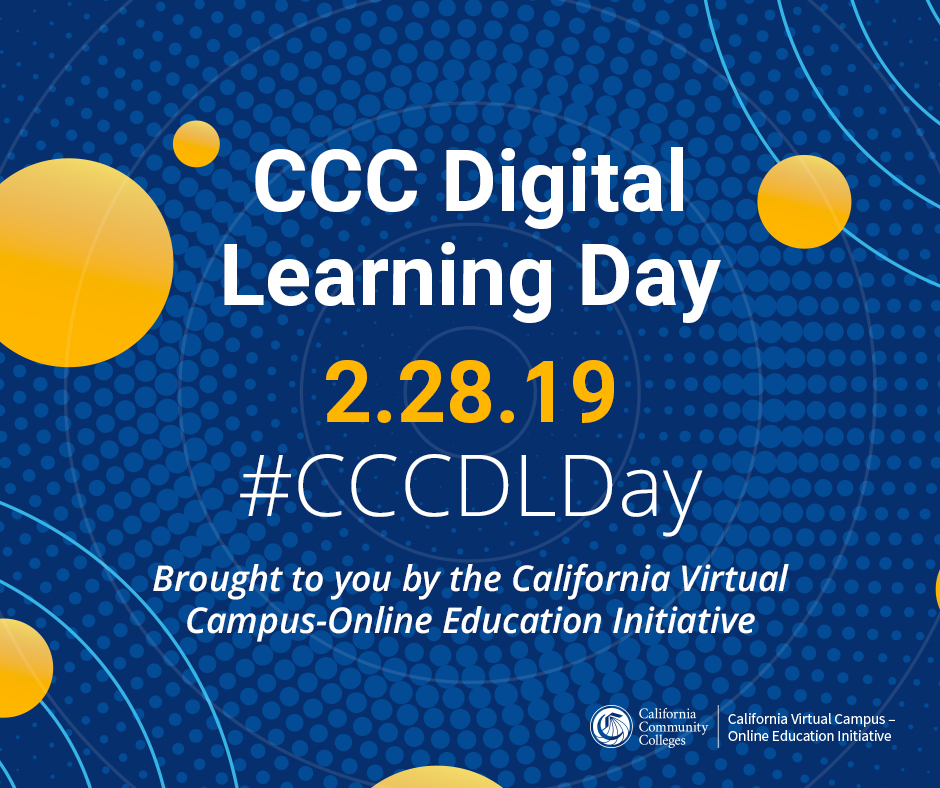Recap of CCC Digital Learning Day 2019

One year ago, CVC-OEI/@ONE held our first free, online conference, CCC Digital Learning Day. On February 28, 2019, this event was held for a second time. Our move away from individual webinars to full day, online conferences has yielded many benefits, summarized here.
CCC Digital Learning Day (CCCDLDay) 2019 was the California Community College's celebration of Digital Learning Day, an international educational event comprised of pop-up programs around the world. Our program, guided by a systemwide advisory committee, was designed around the theme of exploring digital literacies across the curriculum. CCCDLDay is distinct from our annual fall online conference, Can•Innovate, which focuses on supporting the use of Canvas across the California Community College system. For CCCDLDay, we aim to bring educators into a mindful consideration of the many opportunities and challenges that digital learning brings to our mission to prepare students for a successful life. This year, the
The Highlights
The 2019 program included 15 speakers including a keynote presentation, Create: Igniting Our Collective Imagination, by Bonni Stachowiak, host of the Teaching in Higher Ed podcast. A full day of sessions followed, featuring the teaching and learning innovations of CCC faculty and students, including an inspirational student panel moderated by professor Fabiola Torres from Glendale Community College. Matt Mooney, History Professor at Santa Barbara Community College, presented with his former online student, Amber Greene. In Making Creativity SPARKle, the two reflected on the impact of Matt's choice to transform a summative assessment in the course into a student-generated video about a historical topic. Donna Caldwell, from Adobe, shared a demo of Adobe Spark, providing attendees with the how-to knowledge for Matt's innovative practice. Librarians, Cynthia Orozco of East Los Angeles College and Aloha Sargent of Cabrillo College, examined the need for information literacy to be embedded in Canvas courses and shared examples of open educational resources available for use in Canvas. The day wrapped up with two sessions that took us back outside of Canvas and invited participants to join in on "Create" challenges. Chelsea Cohen of Laney College and Gena Estep from Folsom Lake College demonstrated creative uses of Twitter that engage students in networked, global learning. Last, but not least, Liz du Plessis from Barstow Community College and the California Online Community College presented alongside Mayra Avila, one of Liz's online students, and shared how she uses Google Maps to foster collaborative, contextual learning of historical content -- and everyone in the audience had a chance to drop their own pin on a map too. Search the Canvas Commons with "CCCDLDay" and discover a few golden nuggets shared during the day!
The Growth
We saw significant growth from last year in many areas.
- 4,445 online session registrations, 138% growth from 2018
- 3,010 attendances, 83% more than last year
- 791 attendees (unduplicated headcount), a 49% growth from last year
- 100 CCCs were represented at the event, up from 85 in 2018
- 78% people attended online
- CCC attendees were comprised of 40.8 percent full-time faculty, 37.6 percent adjunct, 11.3 percent classified, 4.6 percent administrators, and .8 percent students.
- Attendees rated their overall experience 4.7 out of 5 stars (based on the completion of an attendee survey, n=103).
Download the full CCCDLDay 2019 report.
Thank you for making CCC Digital Learning Day a success. Mark your calendars for Can•Innovate, our next free online conference, on Friday, October 25, 2019. The Call for Proposals opens next week!
